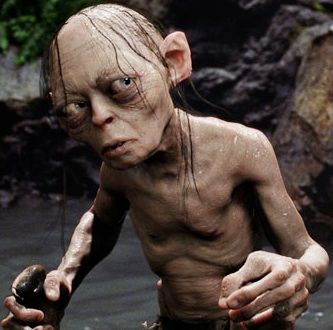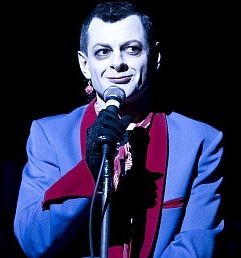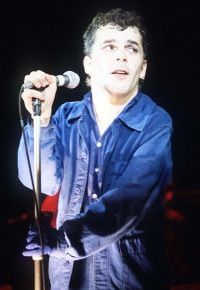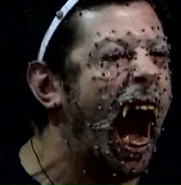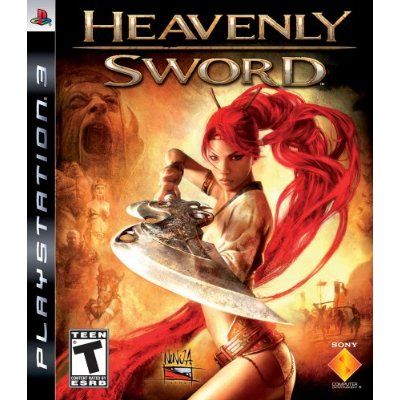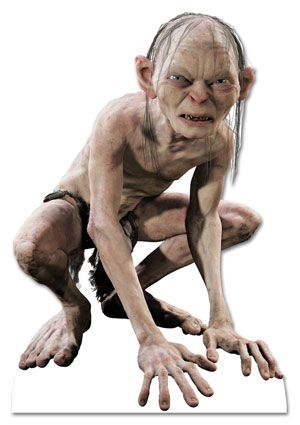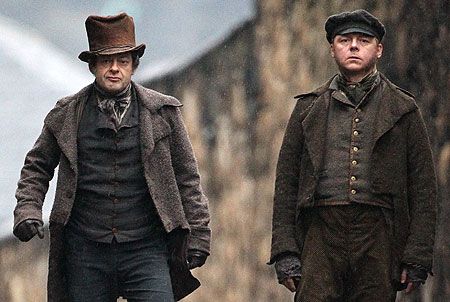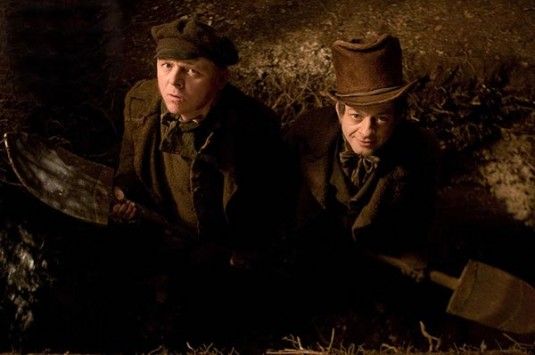Andy Serkis is in flux. Again. In an industry thick with top-flight thespians known for a complete immersion with each new role, the 46 year-old stands apart because of his whole-hearted embrace of new technology. From his complex portrayals of Gollum in The Lord of The Rings trilogy and the title role in King Kong to his work as Captain Haddock in Peter Jackson and Steven Spielberg’s upcoming The Adventures of Tintin: The Secret Of The Unicorn and his return to Middle Earth on The Hobbit films, no other actor has consistently morphed from project to project, over the past decade, with the same combination of acting ability and performance capture innovation.
However, the biggest innovation in Andy Serkis’ latest project, Sex & Drugs & Rock & Roll, is Serkis himself. He reportedly lost nearly 30 pounds, worked out the right side of his body while letting his left side go weak and wore a leg caliper for months to mold himself into the polio-afflicted British punk icon Ian Dury. His role off-camera also changed, as he conceived and shaped the film with the screenwriter Paul Viragh. Add those responsibilities to his recently formed production company, a new performance capture studio/academy and you have a man in transition.
Collider caught up with Serkis for a revealing conversation about his changing career and his own background. Hit the jump for the audio and transcription, along with plenty of stories on The Hobbit, Tintin, Burke & Hare, Steven Spielberg. Guillermo del Toro, John Landis and, of course, Peter Jackson.
We began with news of The Hobbit. Then, for an actor who’s climbed to new professional heights in recent years (his 1st Emmy nomination in 2009 for Little Dorrit and an initial Golden Globe nod in 2008 for Longford), it seemed logical to ask about the ones he’s literally scaled in his personal life.
By the way, if you want to catch his BAFTA and BIFA nominated performance in Sex & Drugs & Rock & Roll, it’s available on a Tribeca Film VOD menu on major cable & satellite providers like Comcast, Time Warner, DirecTV and Verizon FiOS. The film will also have a run in LA from June 24th – July 8th at the Laemmle Sunset 5.
As usual, you can either read the transcript below or listen to the audio by clicking here.
--
Collider: You must be crazed getting ready to head off for the long shoot with The Hobbit.
Andy Serkis: That’s probably not looking like it’s gonna happen till the end of the year-ish. So –
Oh, the shoot has been pushed off from May to—
AS: Yeah, yeah, that’s the latest I’ve heard, but I mean, you know, there’s no… It’s a bit of a movable feast at the moment, really.
What month does that look like? December or so?
AS: I think it’s towards the back-end of this year. I’m not, I’m really, people keep asking me. I’m really ashamed to say, I’m probably no better off than you are. Because dates keep changing & all the rest of it. So, I’m sorry I can’t give you any hot tips there. (Laughs)
Believe me, I understand. In doing research for the interview, you read all different kinds of things on the internet & you wonder, is this true? Is this not true? But I saw something that said that you climbed The Matterhorn by yourself. Is that true?
AS: (Laughs) That’s absolutely true.
Without a guide?
AS: Without a guide, yeah, it’s 100% true and I did it in 1996. Yeah, I mean, climbing’s always been a massive hobby of mine up until, kind of, recent times when I’ve had family, but no, it’s been a driving passion in my life and, uh, I’ve always wanted to climb the Matterhorn. It was the mountain that, sort of, inspired me to climb, as a youngster. So, it was great to be able to get to do it.
And I saw that you said you also wanted to climb The Himalayas, as well? Would you do that by yourself (as he had done with The Matterhorn)?
AS: I think, probably, I would need assistance –
A Sherpa or someone-
AS: Being a little bit later in years now… (Laughs) But I think there’s something wonderful & extraordinary about climbing on your own and just that kind of relationship to the environment. I’m very addicted to the mountains. You know, so, I do like that solitude.
When you’re doing something like King Kong (playing the title role) or Gollum (in The Lord Of The Rings), where there is an actual connection to the land, did that feed into your work on either of the films?
AS: I would say definitely. You know, they’re both very earthy creatures & they do relate into their separate environments, you know, very strongly & they’re both climbers to a certain extent, as well. (Laughs) Although, in real-life, gorillas are not fantastic climbers.
Yeah. Well, you climb a different kind of a mountain with Sex & Drugs & Rock & Roll. So, Ian Dury was a revolutionary figure in British music in the 70s. Were you a big fan growing up?
AS: I was a really big fan of his, yeah, I mean I first heard Ian’s music when I was about 14, I guess. And, you know, I’d grown up with 3 older sisters who, who were listening to America (a folk group best known for “A Horse With No Name”) and Pink Floyd and Steve Winwood and Bread (who had a #1 single in 1970 with the soft rock tune “Make It With You”) & when I first heard Ian Dury, which was on a coach I seem to remember, if this is not mythologizing my own life, too much. I think it was on a coach trip, on a camping trip with, with some schoolmates, sort of all crowding around a transistor radio and listening to (The Blockheads’ hit single that reached #1 in 1979) “Hit Me With Your Rhythm Stick” & kind of being blown away by it. Just thinking, ‘Who is this extraordinary guy? What are these sounds and what are these words and what is a rhythm stick? And then just seeing him on Top Of The Pops (UK show similar to American Bandstand) and just being blown away by this sort of, whirling dervish, strange, you know, Mephistophelian character. You know, this Vaudevillian, strange man & you know, there was something odd about him, but I didn’t know that he had Polio, I didn’t know, you know, kind of, anything about the disability at the time (Polio left Dury with a withered arm and leg which forced him to walk with a cane) and then kind of watched him over the years & saw him develop and then actually, you know, he became an actor. So, in fact, my, sort of, circles crossed with his, later on in the 90s, where he was actually writing music for a play that I was gonna be in called The Queen & I which was based on a book by Sue Townsend. And that was the 1st time I met him & it was a very, kind of, strange experience because it wasn’t the hero that I probably wanted to meet, but in a strange way, it was kind of the perfect meeting because it was, he was not on form. You know, he was- basically, the meeting was in a Chinese restaurant in Leicester, which is in, sort of, mid-England. And, you know, he’d had a few to drink and he was kind of falling out with everyone and having a row and was quite abusive. It was kind of perfect in a way, for, you know, 14 years later, actually playing him. It was rather a perfect memory.
That’s so funny. But you guys also share a visual arts background, as well, in painting. Did that help, as a way in, to the character?
AS: Yeah, I mean, in many ways, you know, I felt very connected to Ian (Dury) on, on a lot of levels. I mean, politically, & sort of, socially, our, kind of, social backgrounds are quite similar in many ways, as well as our kind of artistic endeavors. So there were many, many things that sort of chimed in for me, and kind of made me feel very instinctive about playing him, and, and although, there was sort of a certain amount of impression involved, actually, there’s a lot of myself in the role. That was something that the writer (Paul Viragh) and the director (Mat Whitecross), you know, and I, kind of, worked out, in the, in the years of building up towards, the project. I was, it was more, myself and the writer’s idea, to, to do the project in the first place. So yes, the visual arts, I studied visual arts at Lancaster University and, you know, I’ve always hankered for, to tell, sort of, stories from not just from within a character, but sort of, slightly more, kind of, holistically really. I think Ian’s writing was influenced very much by his visual sense, visual sensibility & his, also, his love of musical, which I also share and also his love of jazz, which I also share. I play saxophone, I play tenor sax. And so, loads of cross-references, and then, also from his background. He was brought up, although he plays this kind of, you know, tough, Cockney geezer character and began to use that persona more and more. In actual fact, he was brought up in a sort of bohemian background, with, with his mom and his two aunts, and it was quite a literary background and his father was the absentee father, which then became his role model or the character that he created for his on-stage persona. So, there were- And I had an absentee father (a doctor who chose to work in his native Iraq before returning to England in 1990 prior to Operation Desert Storm) and you know, was brought up very much with strong women around me, so there are loads and loads of, kind of, cross-references really.
I also saw that you played the Emcee in Cabaret (onstage in Sheffield, England). If you look at the opening scene, I mean, they’re very similar, in terms of style. How much did that feed into the performance?
AS: I have a great interest in Victorian musical & cabaret performances and Weimar artists so the references are there, to Cabaret and also All That Jazz and other films where, where there’s a kind of (influential German playwright Bertolt) Brecht-ian approach, almost to the character standing outside of himself or, in this case, he’s “self-séance-ing.” He’s coming, you know, Ian (Dury) is coming back to this world to tell his own version of his story (Dury died of liver cancer in 2000) Because who, who would be a better person to tell his story than himself. And along with that comes, you know, a visual style, a presentation and challenge to the audience, but also, he’s, he’s making his own life up or he’s re-telling his life up and manufacturing elements of it and as he says, you know, “never let the truth get in the way of a story” so there’s a very much a theatrical editing of his own life, if you like.
(Ian Dury) also says, “The immature artist plagiarizes. The mature artist steals & I am about to grow up.” (Serkis laughs) Did you ever look at, look back at silent film actors like Lon Chaney & think you know, “oh, I can use that. I can use this.” Cause so much of your performance, not just in this, but in so many of your films, there’s a quiet intensity that can work in things like silent films.
AS: I think that’s true. I absolutely feel very much a part of that kind of heritage and embrace that & love the whole kind of notion of transformation for me is (what) excites me about not only acting, but storytelling, & at the moment, I’m sort of, moving into directing & putting projects together & so, yes, I love, I love that notion of a slightly larger-than-life artistic truth, you know, magnifying real emotional truth (or) finding something about human condition (which), you wouldn’t necessarily think you can learn from characters such as Kong or Gollum, but actually they are, you know, these huge amplifications of a human psyche and I suppose those kind of roles have always attracted me definitely.
But do you find yourself, like (Dury) said about the plagiarizing, when he made the joke about it. Do you find yourself, looking back and going, I can point to The Phantom Of The Opera with Lon Chaney & go, ‘I totally understand that & I see what he’s doing there & learn from it & almost” not to say plagiarize or anything like that, but you know—
AS: No, no, no. I know what you’re saying. I think we all do that. I think Ian’s right in that respect. I think everyone does, whether they do it subconsciously, I don’t think anyone’s entirely original. Put it that way, I certainly don’t claim to be original. But –
I think there are a lot of people that would argue with that, but yeah.
AS: (Laughs) Oh, I don’t know. I remember once, I read in a horoscope, because I’m an Aries, I read this terrible thing, which really affected me, which said, “You will never be original. You will always be an interpreter.” (Laughs) I thought, “Oh my God.” You know, I had to live with that on my back for um-
How old were you?
AS: Oh God, I can’t even remember now, when I read that, but I remember being plagued by it for some time and I’ve given up worrying about it now.
You were talking about directing and--
AS: I have a recently formed production company with a producer Jonathan Cavendish (Bridget Jones franchise and Elizabeth: The Golden Age) and we’ve formed a company called Caveman Films and we’ve got a slate of films and we’re working towards putting them together now and having a great time. And Sex & Drugs & Rock & Roll was a very transitional film for me in that I was one of the producers and you know, came up with the idea with the writer and the producer, as well. But, it was a very collaborative event. You know, I really love working in that way. So, I’m planning on spending more time collaborating, bringing up, you know, putting together projects, as well.
Talking about that transition, you’re about to go, you said, at the end of the year, to work on The Hobbit. You’ve been working on (The Adventures of Tintin: The Secret Of The Unicorn) with Peter Jackson and Steven Spielberg. What have you learned from these amazing directors that you’ve had extended time on sets with, as you start to direct projects and produce projects moving forward?
AS: I think something that a lot of the good ones share, specifically people like Peter (Jackson) and Steven (Spielberg) and even Mat Whitecross (The Road To Guantanamo) who I’ve just worked with on Sex & Drugs & Rock & Roll is that, you know, having more ideas supplied by other people around you is a great thing. You know, 12 heads in a room is better than one. And to learn to trust that and to, just watching someone like Peter, for instance, you know, enable and nurture and inspire all the people that worked for him without necessarily having to kind of, tub thump and, you know, get boisterous about it. You know, it’s about eliciting performances, and at the same time, it’s about eliciting, you know, and valuing other people’s work. And it’s seemingly a much more vibrant and positive way of working, really, rather than being a sort of, an authoritarian, who just, you know, has a very fixed way of working and thinks they know what they’re doing. You know, and, and I think, I think you learn that with age anyway, but I think certainly having experienced it with, with those guys –
Is that the difference between great directors? Because you’ve worked on so many different projects over the last 15 years. Is that the difference between somebody who doesn’t necessarily succeed? Is it that insecurity of saying, I know best & these other people don’t. As opposed to, you know, these people who really changed cinema, like (Steven) Spielberg & (Peter) Jackson?
AS: There are no rhymes or reason, actually. Having said that, you know, cause there are people who are absolutely single-minded about their process and they can still come up with great work. But (what) I enjoy and it’s the same, I suppose, as I became more of a family man, I enjoy, I enjoy an atmosphere where it, you know, doesn’t have to be about conflict to get good results. (Laughs) It can be, it can be about people really working as a team & enabling that team to, you know leading the team & allowing people to, to flourish really. And that’s something that I’m beginning to learn. And I think it’s the experience of having children and watching them grow up and you know, I think it’s certainly affected me that way.
Going back to Sex & Drugs & Rock & Roll, you shot that concert sequence last (which opens the film). I know you said you wanted to do it first. But doing it that late, your voice & your physicality, they were ragged by the end of that shoot.
AS: Yeah.
And I wondered, because you’ve also done Gollum, which is so demanding on your vocal chords, and Ian Dury which is very demanding on your vocal chords as well. How much wear & tear do you--
AS: And Kong, Kong was also, as well, you know, very very demanding on the vocal chords.
How long of a recovery process is there for your vocal chords & have you done permanent damage?
AS: I don’t know if I’ve done, it seems to be okay. My voice seems to sort of, touch wood, it seems to sort of, hang in there, really. I mean, it has got kind of deeper and raspier over the years, I guess. But, that could be all manner of things, really, apart from the acting, you know. (Both laugh) Well, in fact, it was very funny because I pretended to my kids the other day that I couldn’t do the Gollum voice anymore & I was going, ‘Oh my God, it’s gone.’ And I was going (feigning attempts at Gollum) ‘My Prec-. My Pr- No, no I can’t do it, I can’t do it.’ And they were just totally freaking out (laughing) because they know how much it’s been such a part of me for such a long time & I said “oh no, I’ve got to do The Hobbit soon & I just, I can’t do it anymore and they were like, They couldn’t believe it. It was very funny.
How often do you break it out on them?
AS: I still, I’m still kind of, I’m still wringing it out, actually. I still haven’t quite broken it to them, yet that it’s probably still there.
You’ve done voices for video games and you directed for Heavenly Sword.
AS: That’s right.
Are you a gamer?
AS: I’m not a big gamer myself. I’ve (become) increasingly interested in games. And I certainly am passionate about, about storytelling in gaming. And, and the marriage of, you know, immersive characters, with gaming. And I’ve just actually worked on another one, which I can probably talk about, because it’s coming out, which is called Enslaved, which I wrote with, again, same company, Ninja Theory (the company he worked with on Heavenly Sword) and that’s coming out in October, this year.
What’s the plot of it--
AS: It’s based on the Wu Ch’eng-en (Chinese folk) story Monkey. It’s based on that story. But it’s about a young girl, who, you know 150 years in the future - Post-apocalyptic story where, where a young girl is trapped on a slave ship that is basically harvesting people. She’s trying to get back to her wind-farming community. She elicits the help of this character Monkey who she basically enslaves by putting a headband – (She’s) a kind of hacker genius & she, she hacks one of the slave headbands on the slave ship and puts him into it, puts it on him, rather and then she uses him to get home. But then, there’s a twist & on it goes. It’s a really cool script and it was written by Alex Garland (28 Days Later and the upcoming Keira Knightley/Carey Mulligan film Never Let Me Go). The music was written by Nitin Sawhney, (who) also wrote the music for Heavenly Sword. That was great. We just wrapped on that & I was co-directing with a guy called Tameem Antoniades, who is the, one of the game designers, game developers at Ninja Theory.
Was that through the (performance) capture production studio & the school that you’re doing?
AS: Not through that, no. But (that’s) brought me to where I am at the moment. Which is just about to, kind of, launch, if you like, The Imaginarium, which is linked to Caveman Films, my production company. And The Imaginarium is basically, gonna be a UK-based premiere performance capture studio, but also an academy, hopefully. And it will produce its own material and serve its other films and games and other content and I’m very interested in the relationship of performance capture to the live arts, such as, you know, theater and dance, contemporary dance. And kind of pushing the applications of performance capture.
What’s –
AS: So, yeah, that’s sort of gradually coming together and I shall be talking about it at the Cannes Film Festival this year, really. Outlining what it’s gonna be offering.
What don’t traditional studios get about motion capture acting?
AS: I think what they probably don’t understand is that it’s a genuine advancement in the actor’s tradition. And you know, the tradition and craft of acting. And it’s the latest step. You know, we, we tend to find forms of delivering stories that fit our times. (Greek) Theater started off and used masks and Kabuki, in the East, they used mask-work. And then, Commedia dell’arte in Italy and then, you know, we’re part of an acting tradition and, and performance capture is no different. Acting is acting, as far as I’m concerned and, you know, how you manifest it is, at the end of the day, not the point. It’s how it affects the story & how it affects the audience. And if people are hungry to be told stories, using, using this form then there’s a reason for that. (The) process of acting is no different to conventional screen acting, in that it’s providing a perfect interface between the director and the performer. So there’s no sort of long way around a viral committee of animators. People are mystified by it and so they kind of think, the acting community thinks they’re gonna be replaced by CG characters and animators think they’re gonna be replaced by performance capture (and) a lot of directors, particularly European directors, who have no experience of it. So that’s again, part of the mission of The Imaginarium is to create a culture whereby it becomes an affordable tool whereby aspiring filmmakers can, can enjoy and use to tell stories as opposed to just being kind of, very expensive studio production type of affair. Because it is, you know, the costs are coming down all the time and I think it’s a fascinating and very liberating actors’ tool.
Even since you did Gollum the first time around (LOTR began shooting in October, 1999 though the bulk of his work began a bit later), how has the technology improved, aside from just the cost, the availability of it? How has it changed?
AS: For a start, when I first started playing Gollum, the volume that you could actually work in, because of the power, the processing, the cameras. You know, we had about 6 cameras and you’re in a tiny little 3 meter square volume and then the computers would break down and the images wouldn’t be fluid and you know, there was a lot of experimentation going on. And over the years, that developed and, you know, with (King) Kong, there was then facial performance capture started to really play its part. And then, when I was working on (the video game he directed & acted in) Heavenly Sword, and other projects obviously, feature films had been developing at the same time and had been developing, you know, Robert Zemeckis’ system (in 2004’s The Polar Express, 2007’s Beowulf & 2009’s A Christmas Carol), but it’s moved from being an isolated character in a small space to multiple actors, basically being directed in a virtual studio where the director is able to shoot the entire (film) there in the studio, as opposed to it just being an element of a live-action shoot. You know, I mean Tintin and Avatar, they’re, although they’re Avatar is half live-action, but the meat of it, I suppose, was all shot in a virtual studio and, as I say, it’s all about the relationship – you know, the director getting performances from actors which is, you know, there’s absolutely no difference, I always use the John Hurt analogy actually, in terms of people understanding. (As) far as I’m concerned, there’s no difference in terms of enhancement from John Hurt playing The Elephant Man (an Academy Award nominated performance, in heavy prosthetics for David Lynch’s 1980 film) & having a team of, of artists (led by Wally Schneiderman who was later a makeup supervisor on Labyrinth for Jim Henson & Christopher Tucker who worked on the famous Cantina sequence in Star Wars) create this incredibly complex, facial mask made of latex & foam. You know, that can be considered enhancing a performance, whereas, you know, what happens on a CG, on a performance capture stage is that that’s done after the fact, after the actor has driven the digital puppet.
((NOTE: At this point, our interview had a happy interruption as Andy’s children came home. We picked up with the following question.))
How long ago, speaking of your kids, how long ago did you, did you let them watch The Lord Of The Rings (trilogy)?
AS: They, well, they’re all different ages, so Ruby, my daughter, was 2 when I started filming & she’s now coming up to 12. I suppose she was about 4 or 5. I mean, they’ve all watched it. My youngest (son) is 5 and he’s, you know, he’s seen them all & they, they all adore it. You know.
What’s it like going back to Middle Earth and I know it’s been put off a bit (in terms of start date). But what’s it like for you, going & getting ready to do The Hobbit later?
AS: It’s very exciting. I mean, you know, last year when we were shooting Tintin, the reshoots of Tintin, I, down in New Zealand, I had a day with (the director) Guillermo del Toro (Oscar Nominee for Best Original Screenplay on Pan’s Labyrinth which he directed and Hellboy & Hellboy II: The Golden Army) and got very excited about what I saw. He showed me some amazing concept art and some really cool stuff & we talked about the character and how, you know, just how he saw it, really and it’s, it’s a fantastic opportunity to, to revisit Middle Earth and have it feel like Middle Earth, but actually have a, a brand new pair of eyes on it and those eyes being, of course, Guillermo’s are gonna be. They’re gonna see something extraordinary. You know, so—
Any word on some of the casting? Bilbo Baggins?
AS: No. (Laughing) I really, really have no idea and, and you know, it’s such a closely guarded secret so, I, I think they’re obviously going to keep it really close to –
Understood. And are you locked in for the Tintin sequel?
AS: Yeah, I think, I think so. Yeah, absolutely, as and when it takes place. Yeah, I believe so.
And is Peter (Jackson) directing it?
AS: The idea is, I think that Peter directs it & Steven produces it. Yeah, I mean, they’re such a fantastic pair. A brilliant team. They’re a really exciting team. Teamwork there is fantastic.
What was it like doing Tintin with Spielberg?
AS: He was fantastic. He’s a fantas- You know, he chose a very specific way of working with us, you know, on a performance capture stage. It was his 1st time, so it was all very exciting. And, and at the same time, you know, Peter was there, sort of, in New Zealand, on the other end of a monitor. (Laughing) At various times of day. And it was just a fantastic, really good fun and you know, it was a great cast & all the rest. (Laughs)
All right. Well, let’s finish with working with Simon Pegg and John Landis on Burke & Hare.
AS: Yeah!
Simon Pegg is so beloved for Hot Fuzz and Shawn Of The Dead. What’s he like on a set?
AS: Simon’s, oh, I mean, he’s great. He’s just, just really kind of quick, he’s funny, he’s just really sort of. I mean, the great thing is that we live about 3 streets away from each other in London. And so we, we drove into work every day and, you know, we had such fun on it. Really, really good laugh. It was an intense experience, you know, because we’re playing these characters who are, you know, in reality, are serial killers, and yet, we’re doing this rather macabre, romantic, black romantic comedy. You know, so it was, it was an intense thing to try. We’d just try and sort of, figure out what we were doing with it. And John, I mean John is brilliant. John Landis is, he’s amazing. Such an entertaining, and amazing character, again. You know, so the three of us, we, we sort of, kind of really, you know we had a great time, we had a really good time.
When you’re carpooling into work, does anybody stop, look over & go ‘oh my God, it’s Andy Serkis & Simon Pegg in the car next to me?’ (Both laugh)
AS: No, everybody, everybody got, just gets on with their work really. Don’t they, when they’re at work. But there were quite a bit of paparazzi there when we were shooting on location in London, actually. They seemed to be everywhere. You know, it was, it was quite hard to keep this one under wraps, actually.
Were you a fan of (John Landis’ earlier work) Animal House & (The) Blues Brothers and An American Werewolf In London?
AS: Oh, absolutely. You know, he’s a, he’s a legend and yeah. Totally, totally. My formative years, his films featured, big-time. You know. Really big time.
Well, listen. It’s been great talking to you. Have a great one.
AS: All right, mate. Take care. Bye bye.

